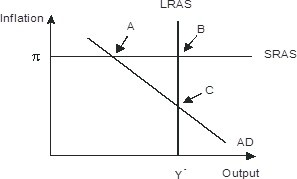Briefly describe "dollarization." Discuss the advantages and disadvantages of dollarization" as a means of establishing a fixed exchange rate.
What will be an ideal response?
POSSIBLE RESPONSE:
a. Dollarization
As an alternative to maintaining a floating currency or a peg, a country can implement full dollarization. Dollarization refers to a country officially adopting another country's currency for all transactions. Because the other currency is often the U.S. dollar, adopting another country's currency is often referred to as dollarization. To dollarize, the government must replace all domestic currency with the other currency. In the case of U.S. dollars, the government sells its official holdings of U.S. government bonds to obtain dollars.
b. Advantages
Dollarization avoids currency and balance of payments crises because it creates positive investor sentiment, which eliminates local currency and exchange-rate speculation. With dollarization there is no exchange-rate risk that the government might devalue or depreciate the local currency in the future. Without a domestic currency there is no possibility of a sharp depreciation, or of sudden capital outflows motivated by fears of devaluation. The result is a more stable capital market, the end of sudden capital outflows, and a balance of payments that is less prone to crises. Dollarization eliminates the risk premium built into local-currency interest rates to compensate lenders for exchange-rate risk. It also eliminates the transaction costs associated with currency exchanges and stabilizes prices in dollar terms, which facilitates closer integration of the domestic economy with the U.S. and global economies. Dollarization prevents the possibility of inflationary monetary policy, which strengthens the country's financial institutions and creates positive investor sentiment toward both domestic and international investment.
c. Disadvantages
A dollarizing country foregoes the right to issue its own currency and therefore the ability to collect "seigniorage," the profit gained from issuing currency that costs less to produce than the actual value of the currency. Instead, the U.S. Federal Reserve collects the seigniorage, and the local government and gross domestic product (GDP) as a whole forego a source of income. A dollarizing country also relinquishes its ability to implement autonomous monetary and exchange-rate policy, including the ability to provide liquidity to its banking system through the use of central bank credit.
You might also like to view...
Susan argues that she is the victim of economic discrimination. The primary technical difficulty for an economist investigating her claim will be
A. defining economic discrimination. B. finding a worker with the same productivity as Susan for comparison purposes. C. defining statistical discrimination. D. measuring Susan’s human capital.
Refer to the figure below.________ inflation will eventually move the economy pictured in the diagram from short-run equilibrium at point ________ to long-run equilibrium at point ________. 
A. Rising; A B. Falling; A; C C. Falling; B: C D. Rising; A; C